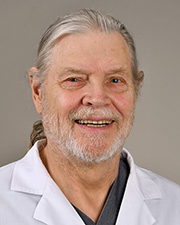Research Program
A Collaborative Approach

James R. Murphy, PhD, leads Infectious Diseases research.
Innovation comes through research, and UTHealth Houston McGovern Medical School invests in leading-edge research. The Department of Pediatrics faculty conduct a wide range of basic, translational, clinical, and public health research with extramural funding in excess of $58 million. The Department has substantial infrastructure for research including wet and dry lab space and staff to support grants and contracts, research methodology, and biostatistics. Strong collaborations across the Department, University and Texas Medical Center are in place to support expansion of research aligned with Pediatric Infectious Diseases faculty.
Goals and Objectives
- To assimilate new knowledge, concepts, and techniques in pediatric infectious diseases
- To formulate clear and testable hypotheses from a body of information to become an effective pediatric infectious disease physician
- To engage in specific areas of scholarly activity to allow for the acquisition of skills in the critical analysis of the work of others
- To advance research in infectious diseases
- Engage in a project, under the supervision of a mentor, which allows the fellow to develop hypotheses or substantive scholarly exploration and analysis that requires critical thinking.
- Attain a basic understanding of the methods needed for the research project and submit a research protocol to the appropriate institutional committee for approval
- Collect and analyze data, derive and defend conclusions, and place conclusions in the context of what is known or not known about a specific area of inquiry
- Present work in oral and written form to a Scholarly Oversight Committee (see below) and submit a first-author manuscript to a relevant high-impact, quality journal for peer-review
The Division houses a wide spectrum of research in Infectious Diseases and International Health. Studies span from investigations of molecular mechanisms of pathogenesis and immunity to clinical trials testing of interventions directed to reducing infection-associated morbidity and mortality. Studies are conducted in volunteers in the United States as well as in less-developed locations. The team leads clinical trials in patients with HIV infection and studies infectious diseases in children in foreign countries. Many research endeavors are made in collaboration with other members of the UTHealth Houston community.
While fellows are encouraged to initiate their own research program, they may select a project that complements existing research activities in the areas of host defense with relation to identification of specific and non-specific anti-infectious protective factors; determination of etiology, pathogenesis, and host responses to infectious agents; and pathophysiology, diagnosis and treatment of infections.
Each fellow is allotted 18 months for research. The research project must be completed before the end of the third year of fellowship training. The project must be hypothesis driven, achievable, and relevant to pediatric infectious diseases. The initiation of a research project starts during the fellowship year 1 and includes the identification of a research mentor and topic, then moves on to preparing the protocol with IRB submission and presentation to the Scholarly Oversight Committee. During the second year, the fellow will collect and analyze the data. During the third year, the fellow will submit a first-authored manuscript of research for peer review. These activities require active participation by the fellow and mentor. The mentor(s) provides continuous feedback, which is essential for the trainee’s professional development.
The Scholarly Oversight Committee (SOC) is a group of faculty who have agreed to guide each fellow’s research work. The SOC determines whether a specific activity is appropriate to meet the American Board of Pediatrics (ABP) guidelines for scholarly activity, then sets a course of preparation beyond the core fellowship curriculum. They will evaluate the fellow’s progress as related to scholarly activity and meet with the fellow early in the training period and every six months thereafter. The fellow will present and defend their scholarly research project to their individual SOC, and that committee will review and approve the final work product prior to submission to the ABP.
Involvement in scholarly activities must result in the generation of a specific written “work product” as outlined by the American Board of Pediatrics. Examples of this include, but are not limited to:
- A peer-reviewed publication in which a fellow played a substantial role
- An in-depth manuscript describing a completed project
- A thesis or dissertation written in connection with the pursuit of an advanced degree
- An extramural grant application that has either been accepted or favorably reviewed
- A progress report for projects of exceptional complexity, such as a multi-year clinical trial
The fellow’s SOC will be instrumental in guiding the fellow’s activity towards an acceptable product. It is the responsibility of each fellow to write their work product report and personal statement as well as obtain approval from the SOC to be eligible to sit for the Subspecialty Board Examination.